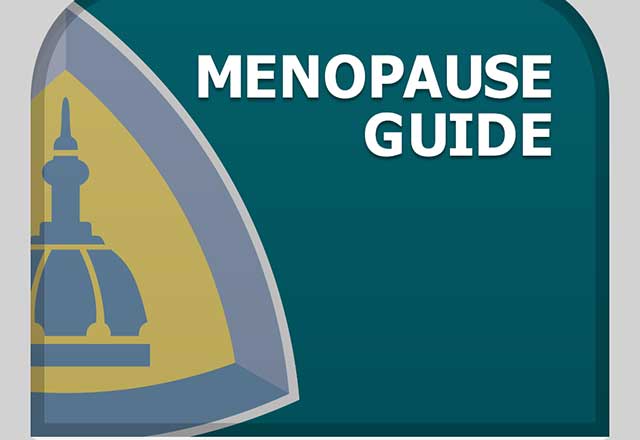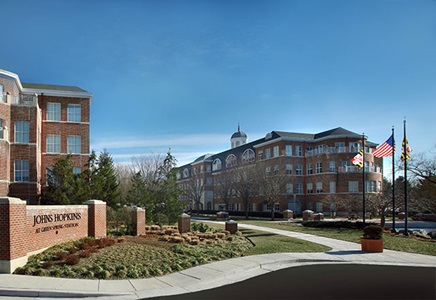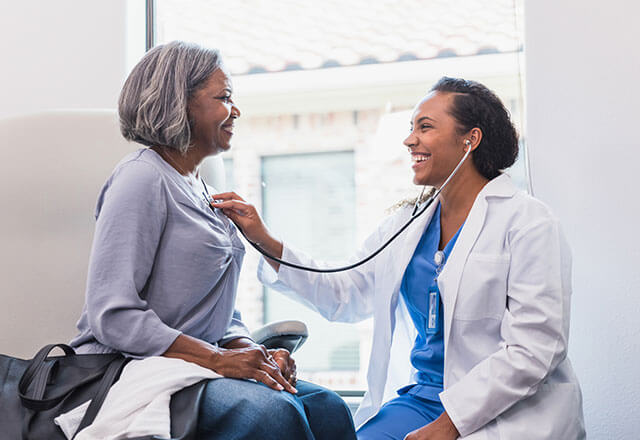Menopause is an inevitable stage of life that can impact a person in many different ways. With people today living longer and more productive lives, our goal is to provide compassionate care with a focus on overall health. Our menopause experts are here to help you understand what you can expect in all stages of menopause and how to promote your optimal health.
Appointment Information
Appointments at the menopause clinic are available by referral only.
If you do not have a general gynecologist who can refer you, you can call to make an appointment with one of our general gynecologists at:
443-997-0400An Introduction to Menopause
Dr. Wen Shen, co-director of the Women's Wellness & Healthy Aging Program, provides an overview of what to expect before, during, and after menopause, and how certain health conditions can be affected.
Why Choose Johns Hopkins for Menopause Care?
Personalized Care for More Than Just Menopause
From managing menopause to treating related conditions and beyond, our team works with you to build individualized, comprehensive care plans based on each patient's unique needs and goals.

Support for a Healthier Post-reproductive Life
We understand the societal stigma associated with aging, particularly for women. Many women may feel discouraged from talking about their menopause symptoms and concerns with health care providers. We are here to shift that conversation, listen and support you.
Multidisciplinary Care
For patients who may need additional care as a result of menopause related conditions, we collaborate with our colleagues across Johns Hopkins to provide comprehensive and coordinated treatment.

Flexibility of Care
We work with your primary care physician and will discuss multiple treatment modalities to determine a course of treatment that is appropriate and safe for you. Telemedicine options may be available to Maryland and Florida residents.

Frequently Asked Questions
-
Menopause is a normal biological event that occurs in all persons with ovaries. The average age of menopause in the United States is 51 years old; however, this age varies and can occur between 40 and 60 years old. Menopause is diagnosed by the spontaneous loss of menstrual periods for 12 consecutive months.
The onset of menopause is affected by:
- Genetics
- Illness
- Smoking
- Surgical removal of ovaries
- Medically induced menopause (such as chemotherapy for breast cancer)
Estrogen and progesterone have effects on all organs in the body, but have especially critical effects on the reproductive system, urinary function, bone and mineral metabolism, cardiovascular function and memory and cognition. Lower levels of these hormones in the blood can produce unpleasant symptoms and can be treated in appropriate patients.
-
Symptoms of menopause vary from person to person but will probably include any or a combination of the following:
- Hot flashes
- Libido or sexual health issues
- Vaginal dryness
- Mood swings
- Sleep disturbance
- Fatigue
- Brain fog
-
Perimenopause or the "climacteric" is the phase that usually precedes the menopause and usually lasts three to five years.
-
Perimenopause can cause symptoms that are due to changes in estrogen and progesterone produced by the ovaries. During this time a person might experience the following symptoms:
- Irregular menses
- Vaginal dryness
- Decreased libido or sexual health issues (link to that page)
- Mood swings
- Depression
- Insomnia
- Hot flashes
- Night sweats
-
Treatments are available for these symptoms, but they are not for everyone and must be discussed individually with a provider in menopause health. These treatment options include:
- Hormone therapy
- Lower dose oral contraceptive pills
- Life style changes
- Non-hormonal prescription medications
- Integrative medicine practices including acupuncture.
There are also ongoing clinical trials that address specific menopause symptoms.
-
Sometimes, in the course of medical treatment, physicians may induce artificial menopause in a patient. Gynecological cancers and autoimmune diseases are among those conditions for which treatment may involve artificially induced menopause.
Our experts treat these patients as well as people who have menopausal symptoms superimposed on other chronic medical problems. We work with a patient’s primary physician and will recommend non-hormonal therapies and possible alternative options to treat the symptoms when possible.
-
Consultations take place at Johns Hopkins at Green Spring Station or via telemedicine.
- You will be asked for your complete medical history.
- Your doctor will ask you about your symptoms; how often they occur, their severity and how you are currently managing them.
- Your doctor will also discuss the many different parts of menopause and clarify which symptoms are related to menopause, and those that may be related to the natural process of aging.
- We will work with you to develop a treatment plan. Depending on your symptoms, this plan may include:
- Hormone therapy or non-hormonal therapies, like SSRI’s
- Acupuncture
- Other homeopathic remedies
- In those patients for which menopause has affected their sexual health, your doctor may refer to a psychiatrist who specializes in couples therapy or a sex therapist.
Menopausal people are at increased risk for osteoporosis, coronary heart disease, breast cancer and Alzheimer's disease. Prevention and early detection of these conditions are essential.
Our doctors will only prescribe those treatments that have been clinically tested and proven to work.
Collaborating Programs
Meet Our Director
Dr. Wen Shen is an associate professor of clinical gynecology and oncology for Johns Hopkins School of Medicine. She is also the clinical director of the Menopause Consultation service and Co-Director of the Women’s Wellness & Healthy Aging Program.
Read more about Dr. ShenResources for Patients and Providers
-
Menopause Preparedness Toolkit
From the Society of Women's Health Research comes this Menopause Preparedness Toolkit. Read more about reproductive aging, wellness and managing your health through the changes of menopause. View the free PDF here.

-
Menopause and Staying Healthy
Find even more resources on menopause and healthy aging from the Women's Wellness and Healthy Aging Program.

-
An Introduction to Menopause
Read more about what menopause is and some of the recommended treatments for common symptoms in this article from our health library.

-
Resources from the Women's Wellness Program
Visit our Strategies for Healthy Aging webpage to find recommended reading on some of the strategies we encourage our patients to follow and find resources on the core symptoms of menopause.

Locations Johns Hopkins Health Care & Surgery Center — Green Spring Station, Lutherville (Pavilion II)

Johns Hopkins Health Care & Surgery Center
10753 Falls Rd
Pavilion II
Lutherville, MD 21093
Google Map
|
Campus Map
Billing Services (toll-free): 1-855-662-3017

